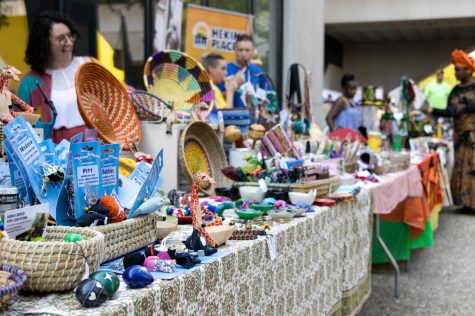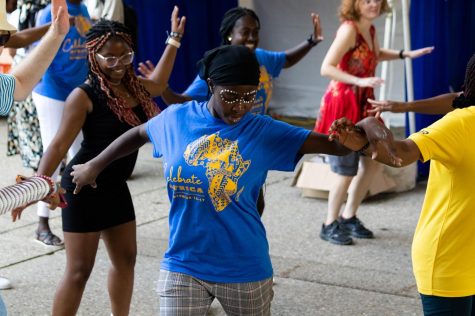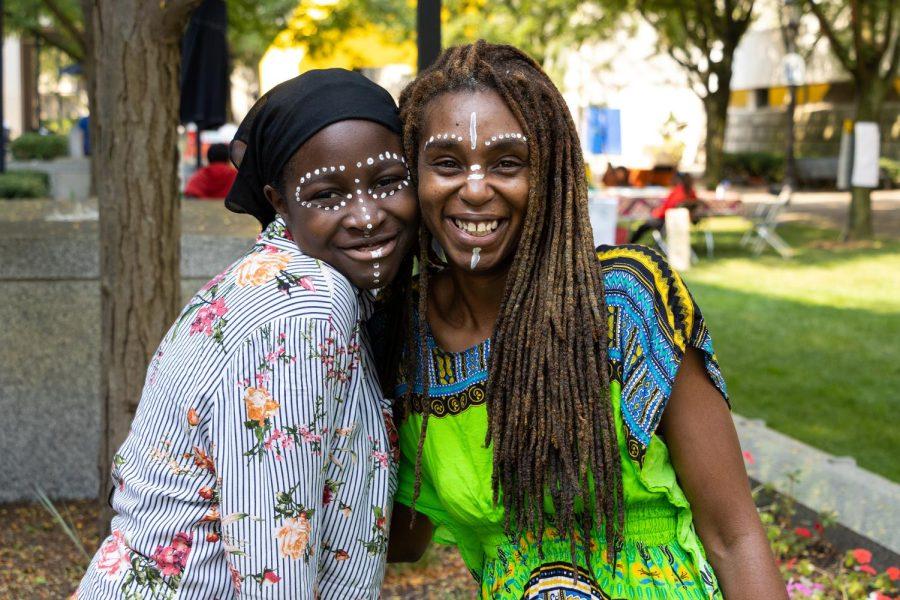Celebrate Africa Festival highlights diversity, diaspora in Pittsburgh
Ethan Shulman | For the Pitt News
Two attendees pose outside of Posvar Hall at the Celebrate Africa Festival Saturday.
September 18, 2022
For Sister Zita Iwuoha, founder of Pittsburgh-based Zita’s Healthy Beginnings, breastfeeding is crucial to lowering Black infant mortality rates.
“There’s a lot of benefits both for the mother and the babies… Breastfeeding reduces the incident of having breast cancer, ovarian cancer or any kind of cancer,” Iwuoha said. “Some of these cancers are really aggressive in the Black population.”
Her organization was one of dozens at the Celebrate Africa Festival, which took place this weekend. The Center for African Studies dedicated the festival to celebrating Africa’s diverse cultures and highlighting the African diaspora currently in Pittsburgh. Professors and organizations joined together to discuss and celebrate Africa’s past, future and present.
Zita’s Healthy Beginnings works in both Nigeria, Iwuoha’s home country, and Pittsburgh, which has a disproportionately high Black infant mortality rate, according to Pittsburgh Equity Indicators.
Iwuoha is currently finishing her doctorate degree in nursing practice at Purdue University. While she is also working full time as a registered nurse, she hopes to help new mothers and babies improve their health.
“Encouraging women to breastfeed for at least six months goes a long way in helping both the babies and the mom,” Iwuoha said.
Catherine Koverola, interim director of the CAS, said she hopes students of all backgrounds can learn about the rich diversity of Africa in both academic and social settings through events like the festival.
“We have faculty who are engaged in over 30 different African countries in scholarship and practice and these are opportunities that are available to students,” Koverola said. “We want them to be able to hear about what’s already going on, and for them to learn about funding opportunities, internships, courses, language skills, opportunities that they can [participate in] at Pitt.”

The first day of the festival was primarily academic, featuring 10 informative seminars open to the public. Amani Attia, a professor in the linguistics department, led a seminar titled “The African Woman: A Closer Look at the Daily Life of a Woman in Egypt, Sudan, and Somalia.”
Beyond the seminars, the day also included roundtable discussions for personalized participation, such as learning about opportunities to fund study abroad trips in Africa.
There was also an introduction to Amharic, Swahili and Arabic languages, which are taught by Pitt’s Less-Commonly-Taught Languages Center. At midday, organizers screened the documentary “Keep Quiet or Die,” which focused on the struggle for democracy in the Democratic Republic of the Congo.
The day concluded with a keynote address titled “Africa’s Trajectory in the 21st Century: From a Historic Pawn into a Player,” featuring speaker Paul Timbye Zeleza, a renowned Pan-African Historian at Case Western Reserve University.
The second day of the festival took place on Posvar Patio. It featured a number of vendors from organizations across Pittsburgh including Ujamaa Collective, Ten Thousand Villages, Immigrant Services and Connections and more. The participants included non-profit organizations, independent sellers and informative organizations.
Hekima Place, a local nonprofit organization dedicated to helping orphaned or abused girls in Kenya, was among the vendors during the event. Laura Bright, the organization’s executive director, sold jewelry at the festival.
“We started as an orphanage for girls who were neglected, abused, orphaned or tested positive to [HIV] as well,” Bright said. “In 2020 we opened our doors to a school… It’s for the girls who live with us but also for the local community, the Maasai tribe.”
Kenya-based women-owned businesses created the jewelry at the stand, most of which typically sell their jewelry at their local markets or villages, Bright said. She added that all proceeds from the festival go to the women.

“They opened us into their world and their community with open arms and we wanted to return some sort of favor, to show them how appreciative we were for that,” Bright said.
Macrina Lelei, associate director of CAS, has worked with CAS since its inception in 2001. She also participated in planning the festival since May. She said a highlight of the festival for her was showing people the cultures of Africa and how those cultures are alive in Pittsburgh, despite not being on the same continent.
“I’m most excited to come together and celebrate the vibrant cultures of Africa, which sometimes we don’t talk too much about,” Lelei said.
Lelei said she believes the festival was a great chance for learning, exchanging cultures and networking with others.
“For me, I’ve been at Pitt for some time now and have been seeing a lot of progress happening ー this is one of them,” Lelei said. “It looks like people are taking notice, and that’s a good thing.”








